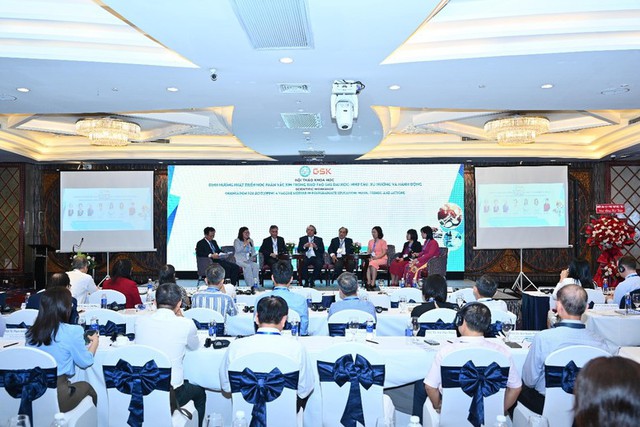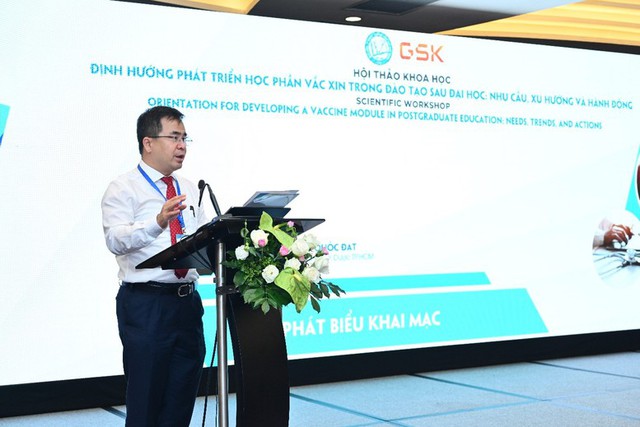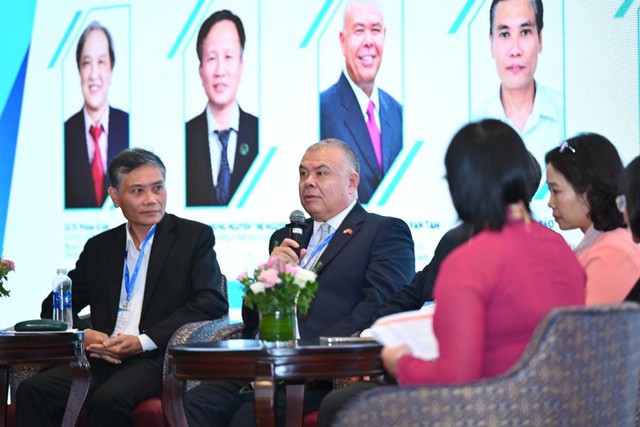HCMC University of Medicine and Pharmacy develops postgraduate curriculum in vaccinology
VGP - Alongside screening and promoting healthy lifestyles, vaccination remains a key measure to reduce disease risks.

The scientific seminar titled "Strategic Directions for Vaccinology Curriculum in Postgraduate Programs: Needs, Emerging Trends, and Practical Actions"
The University of Medicine and Pharmacy in Ho Chi Minh City on November 10 organized a scientific seminar titled "Strategic Directions for Vaccinology Curriculum in Postgraduate Programs: Needs, Emerging Trends, and Practical Actions", in collaboration with GSK Viet Nam, gathering more than 50 delegates from health organizations, international experts, and leaders of medical universities nationwide.
The seminar served as a forum to discuss the development of a postgraduate vaccinology training program, aiming to strengthen the preventive capability of future healthcare professionals and build a sustainable healthcare foundation in the era of an aging population.
Population aging and prevention strategy
Viet Nam is entering a period of rapid population aging, with about 12 million people aged 60 and above. The figure is projected to exceed 21 million by 2035. The prevalence of chronic diseases is also rising sharply, becoming an urgent concern. It is estimated that about two-thirds of Viet Namese people aged 60 and above have at least one chronic underlying condition. Older adults are becoming more vulnerable to vaccine-preventable infectious diseases.
Although the average life expectancy in Viet Nam is approximately 74 years, the healthy life expectancy is only about 65; this means each person spends the last 8–10 years of their life with illness. Infectious diseases are a significant burden on healthcare, social, and economic systems.
To address the disease challenges associated with population aging, experts recommend a shift from a treatment to a prevention strategy. The prevention strategy includes promoting healthy lifestyles through campaigns to reduce modifiable risk factors, medical prevention with screening programs, and immunization strategies to reduce the impact of non-modifiable risk factors.
Among these, vaccination is a key preventive measure in global public health, making an important contribution to achieving the Sustainable Development Goals.
According to The Oxford Vaccine Group, United Kingdom, vaccination is considered one of the most effective public health interventions after clean water, estimated to save about 4 million lives each year.

Assoc. Prof. Dr. Ngo Quoc Dat, Rector of Ho Chi Minh City University of Medicine and Pharmacy addresses the seminar
Vaccinology module for postgraduate medical students
Associate Professor Ngo Quoc Dat, the Rector of HCMC University of Medicine and Pharmacy shared: "Some countries in Europe and the U.S. have included vaccinology in medical education programs, helping healthcare professionals improve their knowledge, skills, and confidence in vaccination counseling and practice."
This model shows that, when properly trained, healthcare professionals can implement immunization more consistently and effectively, while encouraging people to take proactive disease-prevention measures. The development of a vaccinology module for postgraduate medical students is a practical initiative that contributes to strengthening the foundation of preventive healthcare, support implemeting lifelong immunization program to meet the health protection needs of an aging society.
Professor Jonathan Van-Tam, Emeritus Professor, University of Nottingham School of Medicine, United Kingdom, and England's Deputy Chief Medical Officer from 2017-2022 with lead responsibility for immunisation stated: "I am very pleased to have the opportunity to share about prevention strategies in developed country such as the United Kingdom, vaccinology curriculum in medical universities, and the lessons learned from the COVID-19 pandemic. We see that the value of adult immunization can generate up to 19 times the initial investment when considering the overall economic and social value they create 19.

Professor Jonathan Van-Tam, Emeritus Professor (second from left), University of Nottingham School of Medicine, United Kingdom speaks at the seminar
Professor Jonathan Van-Tam said that he hoped to contribute knowledge on how to make immunization a standard of sustainable healthcare including renewed focus on older adults. "I believe Viet Nam is undergoing a breakthrough transformation by focusing on preventive medicine and preventing infectious diseases through life-course immunization," he added.
At the morning session of the seminar on November 10, experts said that the postgraduate vaccinology curriculum will help learners access knowledge on next-generation vaccines and apply artificial intelligence to research and epidemiological surveillance, thereby improving the effectiveness of preventive care. In addition, that same afternoon, there was a discussion session on how to foster innovative thinking and adaptive skills among healthcare professionals, attracting more than 400 students and postgraduate learners, both in person and online.
Expanding cooperation toward health care for all
Towards healthy aging, the University of Medicine and Pharmacy at Ho Chi Minh City also organizes the workshop "Effective Vaccination Strategies for an Aging World" on November 11, with 150 family doctors and experts and 400 online participants. The event discusses disease prevention through vaccination, the implementation of personalized immunization schedules, and Adult Immunization Guidelines from international and domestic medical associations.
The representative of the University of Medicine and Pharmacy at Ho Chi Minh, Phung Nguyen The Nguyen, MD. PhD, Associate Professor of Pediatrics, Dean, School of Medicine shared: "We appreciate the companionship of Professor Johnathan Van-Tam, representatives from universities nationwide, as well as GSK Viet Nam, in developing the vaccinology curriculum program. This is an opportunity for students and postgraduates to access up-to-date knowledge of immunization and preventive medicine in line with international standards. This companionship not only contributes to improving training quality but also inspires future generations of doctors in their mission to protect and care for people's health".
Dr. Pham Thi My Lien, President of GSK Viet Nam, shared: "GSK believes that integrating vaccine modules into the training curriculum will help build a solid foundation for future preventive medicine, helping medical teams - especially treating physicians - proactively incorporate vaccination into patient care, particularly for the elderly and those with chronic diseases. GSK is proud to partner with Ho Chi Minh City University of Medicine and Pharmacy on this meaningful semniars. With the unity of science, technology, and experts, we can move towards the common goal of overcoming diseases together and making a positive impact on the health of Viet Namese people".
The curriculum in vaccinology and virology will be developed, approved, and incorporated into the official training program from 2026. It is expected that more than 2,000 doctors will be trained each year, aiming to expand implementation nationwide to universities by 2027./.

